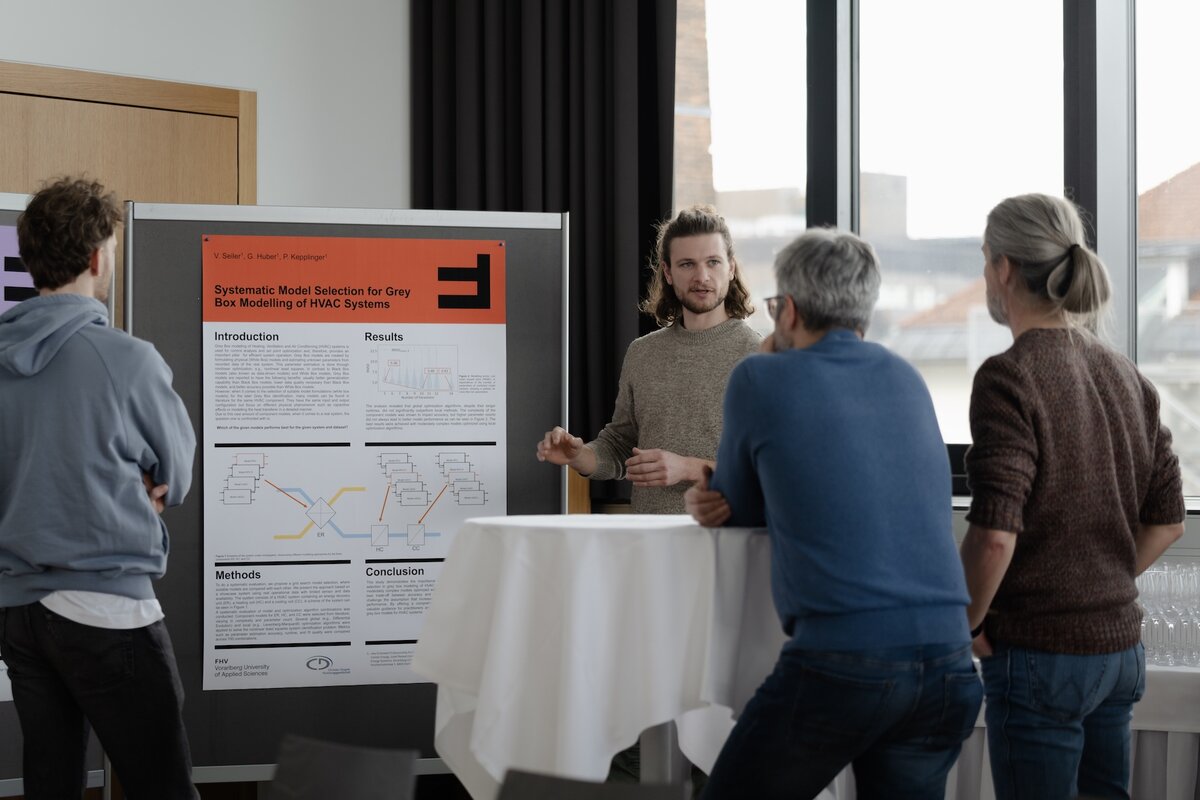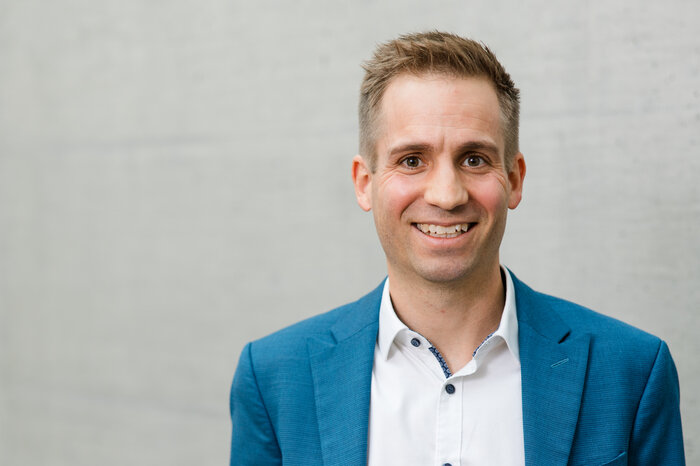Give thermal energy systems a brain
(Issue 1 / 2025) When a thermodynamicist and a mathematician meet... This led to the founding of the Josef Ressel Centre for Intelligent Thermal Energy Systems (JRZ ITES) in 2020.
Read Markus Preißinger's feature article on the FHV cross-cutting topic of digitalisation in the field of energy and the environment to find out what a Josef Ressel Centre is and how companies in Vorarlberg benefit from it.

Research and development – four pillars for a sustainable impact
For research and development to have a lasting impact in the form of innovative products and business ideas, four pillars are needed: an idea, the right people, a suitable funding instrument and time.
Even before I moved from the University of Bayreuth to FHV – Vorarlberg University of Applied Sciences in August 2017, I had the idea of making systems and technologies more digital – specifically in the thermal sector. I wanted to anchor the often neglected topic of the operation and optimisation of thermal energy systems in an increasingly digital world at the Energy Research Centre.
Fortunately, I found people who had a fundamental understanding of thermal energy technology on the one hand and could contribute important skills that I lacked on the other.
As a trained mathematician, Peter Kepplinger was not only able to model, but also to formulate optimisation problems in such a way that they could be solved with modern algorithms. Gerhard Huber contributed many years of industrial experience in the operation of thermal energy technologies. Together, we set out to find suitable partners and funding.
Josef Ressel Centres for cutting-edge research by and with companies
The funding instrument was quickly decided: we wanted to bring a new Josef Ressel Centre to the FHV. These centres combine applied basic research with specific problems from industry and are therefore financed half by the federal government and half by the partner companies. With a term of five years, they provide sufficient time to conduct cutting-edge research, but they are also flexible enough to adapt content to the changing needs of the partners. In other words, they offer time and flexibility – in our view, key elements for innovation in projects with companies.
Five Vorarlberg companies were convinced by our idea and became part of the new centre:
- DieffenbacherEnergy (formerly BERTSCHenergy) offers solutions for project development, plant design and measurement technology in the field of power plant planning and construction.
- Gantner Instruments specialises in sensor data acquisition and processing in test and measurement systems and offers its own cloud environment with data evaluation.
- Netzer MSR GmbH specialises in the planning and monitoring of tailor-made plant concepts for industrial companies in the field of heating, cooling and ventilation.
- As the largest family-run company in the Austrian dairy industry, Rupp AG also focuses on energy efficiency in the production of cheese products.
- Weider Wärmepumpen GmbH develops innovative heat pumps with the aim of achieving maximum efficiency and quality.
Innovations made in Vorarlberg
With an interdisciplinary team of eight researchers and together with our corporate partners, we have been able to provide important impetus for innovations made in Vorarlberg over the past five years, e.g.
- Prediction methods for thermal power plants: DieffenbacherEnergy uses our prediction methods to optimise the operation of its power plants, employing a cloud system from Gantner Instruments.
- Optimisation of cooling systems in the food industry: By implementing model predictive control and using cloud data analysis, we can significantly increase the energy and cost efficiency of Rupp AG's cooling systems.
- Heat pump systems of the future: In a cloud environment, we continuously analyse heat pump data with Weider Wärmepumpen in order to detect and rectify faulty operating conditions at an early stage. This enables us to increase the reliability and efficiency of heat pump systems.
- Energy-efficient control of ventilation systems: By combining machine learning and expert knowledge, we develop intelligent control strategies that minimise the energy requirements of Netzer MSR ventilation systems.
We were able to demonstrate that the main hypothesis of the Josef Ressel Centre has been confirmed after five years of joint research and development: the large amount of previously lost operating data stored using different technologies (cloud, central physical storage or on the device) can be utilised through the integration of system identification and optimisation approaches – both scientifically in research and economically in Vorarlberg companies.
And what happens now, you may ask? The companies will continue to develop the joint innovations and apply them in their business areas. The students who completed their master's theses as part of the project are providing much-needed impetus in the field of thermal energy technology as urgently needed specialists. The three doctoral students are completing their dissertations, thereby strengthening the reputation of the Energy Research Centre in the scientific community. Last but not least, the FHV has once again proven that it is a reliable partner for applied research with companies.
Overview Josef Ressel Zentren at FHV:
JRZ for intelligent thermal energy systems
JRZ for applied scientific computing in energy, finance and logistics
JRZ for material processing with ultrashort pulsed laser sources
About the author:
Markus Preißinger headed the FHV Energy Research Centre from 2017 to 2024 and the Josef Ressel Centre for Intelligent Thermal Energy Systems from 2020 to 2025. Since 2022, as head of research at the FHV, he has been committed to even stronger cooperation between the FHV and regional companies and institutions, as he is convinced that this will strengthen Vorarlberg as a business and science location in the long term. In his private life, he can be found on one of his bicycles in the mountains and valleys of Vorarlberg – sometimes alone, sometimes with his family.
If you are interested in a future Josef Ressel Centre or other cooperation with the FHV, you are welcome to contact the author.
